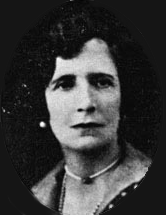Nesta Helen Webster | |
|---|---|
 Webster aged 53. | |
| Born | Nesta Helen Bevan 24 August 1876 Trent Park, London, England |
| Died | 16 May 1960 (aged 83) |
| Occupation | Author |
| Alma mater | Westfield College |
| Subject | International Revolutionary conspiracy, feminism |
| Notable works | World Revolution: The Plot Against Civilization Secret Societies and Subversive Movements |
| Spouse | Arthur Templer Webster |
| Relatives |
|
| Part of a series on |
| Feminism |
|---|
 |
|
|
Nesta Helen Webster (née Bevan, 24 August 1876 – 16 May 1960) was an English author who revived conspiracy theories about the Illuminati.[1][2][3] She claimed that the secret society's members were occultists, plotting communist world domination, through a Jewish cabal, the Masons and Jesuits.[2][4] She blamed the group for events including the French Revolution, 1848 Revolution, the First World War, and the Bolshevik Revolution.[5] Her writing influenced later conspiracy theories and ideologies, including American anti-communism (particularly the John Birch Society) and the militia movement.[6]
In 1920, Webster became a contributor to The Jewish Peril, a series of articles in the London Morning Post centred on the forged document The Protocols of the Elders of Zion.[7][8] These articles were compiled and published in the same year in book form under the title of The Cause of World Unrest.[9] Webster claimed that the authenticity of the Protocols of the Elders of Zion was an "open question".[10] Before World War II, Webster was involved in British Fascist groups.[11][12]
- ^ Bruno Duarte, Miguel. "Illuminati," Archived 5 February 2013 at the Wayback Machine The Inter-American Institute, 11 December 2012.
- ^ a b Who are the Illuminati? Independent on Sunday (London) 6 November 2005.
- ^ Stauffer, Vernon. New England and the Bavarian Illuminati, New York, 1918.
- ^ Not without Honor, Harvard University Nieman Reports, 22 March 1997.
- ^ New World Order, Old World Anti-Semitism, The Christian Century 13 September 1995.
- ^ Lee, Martha F. (Martha Frances) (2005). "Nesta Webster: The Voice of Conspiracy". Journal of Women's History. 17 (3): 81–104. doi:10.1353/jowh.2005.0033. ISSN 1527-2036. S2CID 143991823.
- ^ "The So-Called Jewish 'Protocols'," The Weekly Review, Vol. III, No. 83, 15 December 1920.
- ^ "Puncturing the Protocols," The Weekly Review, Vol. V, No. 122, 10 September 1921.
- ^ The Cause of World Unrest, G. P. Putnam's Son, 1920.
- ^ Webster, Nesta (1924). Secret Societies and Subversive Movements. London: Boswell Printing & Publishing Co. p. 408.
Contrary to the assertions of certain writers, I have never affirmed my belief in the authenticity of the Protocols, but have always treated it as an entirely open question. The only opinion to which I have committed myself is that, whether genuine or not, the Protocols do represent the programme of world revolution, and that in view of their prophetic nature and of their extraordinary resemblance to the protocols of certain secret societies in the past, they were either the work of some such society or of someone profoundly versed in the lore of secret societies who was able to reproduce their ideas and phraseology.
- ^ Cite error: The named reference
:0was invoked but never defined (see the help page). - ^ Cite error: The named reference
:1was invoked but never defined (see the help page).